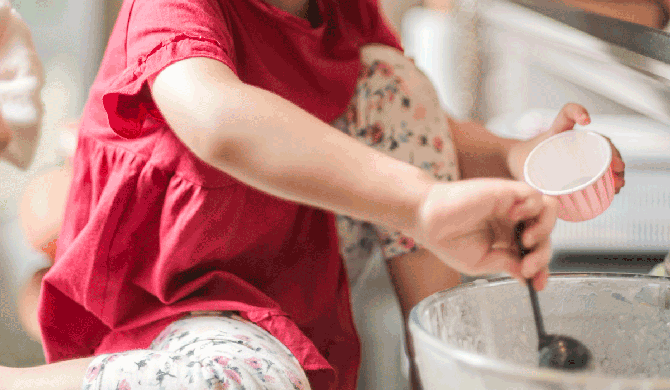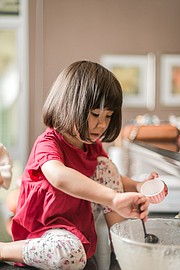Letting your kids help with daily tasks can help them feel more connected. Even if it's just one or two meals a week, find a way to involve your kids in the meal-making process. Photo by Tanaphong Toochinda on Unsplash
The following story is reposted with permission from NimbusHaus.com. Find the original version here.
With the outbreak of COVID-19, it's a stressful time for parents and kids, but there are things you as a parent can do to make this time more safe, emotionally stable, and fun for kids and even yourself. Here are some ideas and practices you can start using today to make this time more manageable.
Decide What You Want Your Kids To Know and Talk With Them
This is a good time to communicate and build trust with your kids. There is a lot of information out there about COVID-19, and while it's important to know the facts and stay safe, it's also easy to get overloaded with stressful, random information. Keep the information your kids know clear, simple, and short. Your kids don't need to know which celebrities have it, what hot take an influencer has on their home remedy for a cough, or how many people are dying each day.
What your kids actually need to know are the basics; people are getting sick and a small percentage are dying, it's essential to social distance right now and wash hands regularly. Depending on their age, this can be as simple as staying home and making sure they wash their hands regularly. Older kids will likely have questions. Ask them what they know and if they have any concerns. Address their concerns as best you can. For questions you don't know the answers to, look it up. Honesty goes a long way in preventing fear.
Don't Let Young Kids Watch The News and Monitor News Intake for Older Kids
While it's tempting to leave the TV on in the background through the day, the uncertain stream of random and often scary information can be stressful for your kids. Watching the news with your kids (especially younger kids) can give them the sense that things are out of control. If you have young kids, DVR your news and watch it at the end of the day after they have gone to bed. Older kids will likely be interested in the news, so try to watch it with them, but be sure to limit your time and watch something else afterward. If you personally need the morning's news, check it on your phone, so your kids don't see what you're looking at. News sources such as NPR have podcasts that synthesize the day's news so you can limit your time and still get what you need.
Let Your Kids Help Make a Centralized Sanitation Station and "To-Go Bag"
A sanitation station is an area near the sink that has soap, paper towels, a trashcan, tissues, and wipes. A sanitation station serves as a visual reminder to wash your hands and take precautions when coughing or sneezing or blowing your nose. Depending on the age of your kids, this can include a decorative sign that says "Sanitation Station" which your kids can help make. You can even put post-it-notes on key places in the house reminding people to wash their hands. Key places include the front door, the fridge door, bathroom doors, etc.
Make a "to-go" bag that has items you'll need to stay clean while you're out. Your kids can help select a brightly colored bag and help you make a list of what to include. Include things like alcohol-based hand sanitiser, wipes, small bottles of water, tissues, hair ties (which help reduce the need to touch one's face), baggies of to-go snacks, etc.
Schedule Calls and Video Chats with Friends and Family
Schedule a regular call or video chat with important people in your family's lives. The calls don't have to be long or formal, just 5 or 15 minutes to say hello. This is a great way to help younger kids stay connected, even when they can't be with their friends. Virtual playdates are also a great way to connect.
Don't Limit Kid's "Screen Time." Limit Their "Feed" Time.
Screens that engage kids through gaming, entertainment, and education can be very useful in these times, and it can be good for parents who normally limit screen time to ease up a bit. What should be looked after is how much time kids spend looking through their social media feed. While social media is a great way to stay connected for older kids, it can be isolating to spend hours scrolling through social media feeds, where they're exposed to more extreme, persistent views, gossip, and news about the outbreak. Limiting "feed time," for older kids, and even for adults, is a good way to give your brain a break from thinking about "everything."
Actively Find and Read Books and Novels
Involve your kids in finding age-appropriate books and novels to read. Read through book descriptions with them and help them find a book they'd like to read in their downtime. Get these books from the library, or Amazon, or wherever you can. Designate a specific time for reading every day, or at least Monday through Friday. In this time, your kids can read one of the books they've chosen. For kids with focusing issues, try to let them read in a preferred space every day. Some may want music in the background while they read. This may take a few days to put into practice, but this routine can help reduce anxiety and give you some much needed downtime as well.
Get Your Kids Involved In Cooking
Letting your kids help with daily tasks can help them feel more connected. Even if it's just one or two meals a week, find a way to involve your kids in the meal-making process. Start with everyone washing their hands. Then assign age-appropriate tasks to each child. Perhaps your youngest could put bread in the toaster, or set the table (and clear the table afterward). An older child could chop ingredients for a salad or load the dishwasher after a meal. For kids who really like to cook, let them prepare an entire meal and you clean up. While there may be some resistance, these kinds of practices help kids feel more in control of their lives.
Make a ShipShape Chart
What is a shipshape chart? It's a fancy chore chart that includes more fun non-chore related tasks. This chart has each family member's name on it and the tasks they can do every week. You can get fancy with this, or keep it simple. Make sure everyone in the family has tasks to be responsible for, whether it's feeding the dog, taking out the trash, cleaning the kitchen, bathroom, etc. Be sure to include activities beyond chores, like dancing, drawing, yoga, or making music. Seeing the week laid out ahead of time can give out-of-school kids a sense of routine.
Go Outside When You Can
If you can safely go outside, go for daily walks with your kids. Sunshine and fresh air can elevate everyone's mental state. Before leaving home, remind kids of the safety protocols for your area and remind them to waive and talk to people they know from a distance. For younger kids, this may take practice. Once you're home, remember to have everyone wash their hands.
Connect Your Kids With Giving Back
There are a lot of people in need right now and there are many ways you can connect your kids with giving back. You can have them clean out their clothes and toys and donate the ones they no longer use or have outgrown. Your kids can ask your friends and relatives to do an "art for charity" virtual event where patrons promise to donate a certain amount of money in exchange for a unique piece of art drawn by your kids. Your kids can host a virtual benefit concert for a charity helping your community. Whatever you do, let your kids see that communities are virtually coming together to help one another.
Having a routine, things to look forward to, and open channels of communication in your household will go a long way to helping you cope with and get through the challenges ahead. And, if all goes well, you and your kids will someday look back on this time and find bright spots where they made a difference and made positive memories.
By Jennifer L. Jacobson, Founder of NimbusHaus.com



